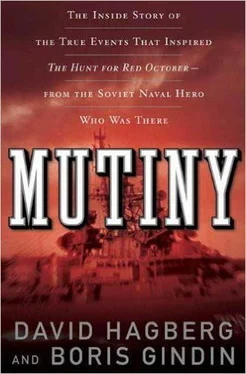If Potulniy or Novozilov or even Sablin is in the officers’ dining hall while they are in port, the jokes cease and everyone finishes eating as quickly as possible and gets back to work.
“We had to prove that we didn’t have any extra time on our hands,” Gindin says.
But at sea the atmosphere, at least in the dining hall, is more relaxed, even when the captain is there. Everyone tells jokes, because the pressure on them is enormous and a good belly laugh provides a little relief.
Even Potulniy isn’t above playing a little practical joke. The Storozhevoy had a new dietary officer assigned to the crew. His main job was to take charge of all the food and miscellaneous supplies aboard. According to the duty roster, he was listed as an assistant to the captain. This dietary officer had never gone to any naval academy to learn a profession; he got his rank in an army college before he was sent out to the fleet, but as a captain’s assistant he thought that he was a pretty big deal.
So a few days out, Potulniy sends the dietary officer to do a complete inventory of all the food and supplies, and when he is finished he bumps into Boris in a corridor.
“The inventory is finished, Comrade Lieutenant,” the big shot says, a self-important smile plastered on his rat face.
But Boris has caught on right away. “I don’t think so.”
“What do you mean? I checked everything!”
“But not the lifeboats. They have to be checked for supplies such as chocolate and spirt. You know, in case we have to abandon ship we’ll need those things in order to survive. But a lot of the time the sailors get into the lifeboats and steal everything.”
Of course this is simply not true. Lifeboats are hermetically sealed in canisters and open automatically when they are launched into the water.
“I’ll take care of it immediately, Comrade.”
“But you’ll need the captain’s permission first,” Boris reminds the young officer.
The next day at lunch in the officers’ dining hall Potulniy introduces the new dietary officer to the others. “How do you like this?” the captain says. “Our new lieutenant has never seen a ship before, except in a picture, and now he wants my permission to open all our lifeboats to check the supplies. What do you think?”
The joke is on the hapless lieutenant, and the other officers have a good laugh, in part because the guy was such a self-important ass but also because the captain has just shown them that he’s human after all.
At 0800 everyone not stuck at their duty stations assembles on deck to salute the raising flag. This is another time that the crew, especially the officers, is feeling a wave of patriotism. It’s the same in every navy; some of the crew are happy to salute their flag, while others couldn’t be bothered. And all of the patriots pretty well know who’s in the other group.
The first four-hour duty shift begins at midnight, the second at 0400, and the third at 0800. So it is right after the flag ceremony when the oncoming crews assemble in the dining areas, where they meet their officers, who escort them to their duty stations to conduct the first equipment checks of their shift.
During each twenty-four-hour period one officer and a sailor-assistant are assigned the responsibility for the entire ship. It’s their job to make sure that the proper officers show up at their assigned times. During the evening hours, from ten at night until six in the morning, it’s the sailor’s job to go up to each duty officer’s cabin and remind him that his shift is coming up. During the daytime hours, it’s the officer in charge who makes the announcements over the 1MC, the ship’s intercom.
The officers not on duty from 0900 until noon on alternate Mondays are expected to teach political classes to the sailors in their divisions. No one likes this job except for Sablin, who often volunteers to handle it for the officers. No one turns down the zampolit.
On all other days, from 0900 to noon, the standby officers make sure that their areas of responsibility are clean and conduct training sessions for their sailors on the equipment and on their military duties and responsibilities.
From noon to 1300 is lunch, and afterward until 1400 is something called admiral’s hour. It’s when everyone aboard ship who isn’t on duty gets to relax. It’s about the only time in the day that anyone gets a real break, although some officers find little things for their sailors to finish up, and of course the inventive sailors make damned sure they’re nowhere in sight when their officer comes looking. It is admiral’s hour, after all.
The 1400 period starts with a glass of juice for every sailor aboard, followed by two hours of training on emergency procedures: military actions including biological or chemical attack—the Storozhevoy is a warship—as well as the usual emergency procedures covering fires, man overboards, and other accidents.
From 1600 to 1800, more ship cleaning—this time not only the duty stations but every square centimeter of the ship is washed and polished. That includes the crew’s cubricks and the officers’ cabins.
From 1800 to 1900 is dinner, and from 1900 until 2030 is another free period. But this is one of the times when sailors and officers alike are expected to play catch-up with whatever they didn’t have a chance to finish earlier. And there’s always some of that.
A warship at sea, even in time of peace, is an extremely high-maintenance master that demands loving care and attention every minute of every day.
From 2030 until 2100 everyone aboard is served evening tea. The sailors get one slice of bread while the officers get bread, butter, and cookies.
Then until 2200 hours, or 10:00 P.M., it’s time to prepare for bed, when it’s lights-out, except for the officer of the day and his sailor-assistant, the on-duty officers and the sailors in their divisions, and the on-call officers who are expected to take over if the duty officers need to step away from their posts for whatever reasons.
In an emergency, like what happened in the Mediterranean Sea when the Storozhevoy was on the way to Cuba, everyone is on duty; no one rests. At any other given time one-third of the ship’s personnel are on duty, one-third are on call, and one-third are off duty.
When Boris goes on duty just after the morning’s flag ceremony, he collects his crew of seven sailors and one midshipman in the midshipmen’s mess and after a few words leads them down to the machinery spaces. Among his crew are a pair of diesel specialists who watch over the engines that generate the ship’s electricity, one electrician who makes sure the power distribution equipment and panels are maintained in working order, one steam specialist who makes certain that the equipment and piping to create and manage steam for heating water and the ship’s compartments work, one fuel specialist who not only monitors how much fuel the ship is using and how much is left but also makes sure that the fuel pumps are up to par, and one midshipman who is in training for a job like Gindin’s.
The last two of Boris’s crew are the gas turbine specialists whose job is to make sure that the two marching engines and the pair of boost engines are doing what they’re supposed to do. As soon as these two guys get to the engine room and before the old crew is relieved, the specialists check the books. Each of the engines has its own log in which the gas turbine specialists record the oil pressure, temperature, RPMs, air pressure, and a host of other readings, along with any problems that may have cropped up during the shift. Then they physically inspect all four engines, making sure that nothing is wrong, nothing is leaking, and all the gauges are reading what they’re supposed to be reading, and then they finally sign the books. That means these two guys have accepted responsibility for the engines, under Gindin’s supervision, and the old crew can go on standby for the next four hours.
Читать дальше












